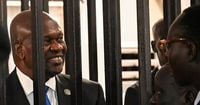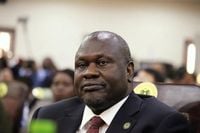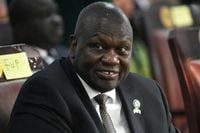On September 22, 2025, the eyes of South Sudan—and much of the world—turned to Juba, where the long-anticipated criminal trial of suspended First Vice President Riek Machar began in dramatic fashion. The case, held under tight security at the city’s Freedom Hall, was broadcast nationwide and marked Machar’s first public appearance since he was placed under house arrest in March of this year. As he sat inside a steel cage alongside his co-defendants, the proceedings quickly became a focal point for the country’s unresolved political tensions and fears of renewed conflict.
The charges against Machar are as grave as they come: treason, crimes against humanity, murder, conspiracy, terrorism, and the destruction of public property and military assets. Seven of Machar’s close allies, including Petroleum Minister Puot Kang Chol, and as many as 20 others, stand accused with him. The government alleges that Machar and his circle were behind a series of violent raids by the Nuer-dominated White Army militia in northeastern South Sudan earlier this year, culminating in a brutal attack on a military base in the town of Nasir. According to government statements cited by Al Jazeera, more than 250 soldiers were killed in that assault, while Reuters reports that dozens of civilians lost their lives and over 80,000 people were displaced.
President Salva Kiir, Machar’s longtime rival and the country’s leader since independence, suspended Machar by presidential decree earlier in September after the charges were formally filed. The two men have a history stretching back decades, marked by both cooperation and fierce rivalry. Kiir is a member of the Dinka, South Sudan’s largest ethnic group, while Machar belongs to the Nuer, the second-largest. Their personal and political feud has often mirrored—and inflamed—the country’s broader ethnic and political divisions.
It was not just the gravity of the accusations that made Monday’s proceedings extraordinary. The sight of Machar, dressed in a dark suit and cobalt blue tie, sitting behind black bars in a courtroom normally used for weddings and concerts, was itself a powerful symbol of South Sudan’s ongoing struggle to reconcile its turbulent past with hopes for a stable future. Media access to the trial was sharply limited, with only the state broadcaster permitted inside, according to Reuters.
From the outset, Machar’s legal team challenged the legitimacy of the court. Geri Raimondo Legge, Machar’s lead lawyer, argued forcefully that, “the court was unconstitutional, unlawful, illegal and void,” insisting that Machar still retained the immunity of a sitting vice president under the terms of the 2018 peace deal that ended South Sudan’s devastating civil war. “We pray the court order the immediate discharge of His Excellency Dr Riek Machar Teny, the first vice president of the republic of South Sudan, and the seven accused persons for being arrested and detained unconstitutionally,” Legge told the court, as reported by Reuters.
Prosecutor Ajo Ony’Ohisa Igele, representing the state, dismissed these arguments as “unfounded and weak.” The government maintains that Machar’s actions—allegedly supporting the White Army militia in its attacks—constitute a direct threat to national stability and unity. The charges against Machar and his supporters, the government says, are not just a matter of law but of national security and justice for the victims of violence.
Machar’s party, the Sudan People’s Liberation Movement/Army-in Opposition (SPLM-IO), has called the charges “fabricated” and insists that its members were arrested illegally. They argue that Machar’s prosecution violates the spirit and the letter of the 2018 peace agreement, which was painstakingly negotiated with regional and international support after a five-year civil war that left an estimated 400,000 people dead and displaced more than four million—about a third of the country’s population, according to Africanews and Al Jazeera.
These arguments are not merely legalistic. The 2018 peace deal, which created a fragile unity government with Kiir as president and Machar as his deputy, was widely seen as South Sudan’s best hope for lasting peace. Yet, as AP and BBC have reported, the arrangement left many issues unresolved. Armed factions loyal to each leader were never fully integrated, reforms were delayed, and presidential elections have been repeatedly postponed. Sporadic violence has continued, and both sides have accused the other of violating ceasefire agreements. The United Nations Mission in South Sudan (UNMISS) has warned that the country risks “losing the hard-won gains of the past seven years” and sliding back into full-scale civil war.
The ethnic dimension of the conflict remains a potent and dangerous force. The White Army, composed largely of Nuer youths, has a long and bloody history in the country’s conflicts. The government’s accusation that Machar ordered the Nasir attack is especially charged given the history of ethnic violence between Nuer and Dinka forces. The memory of the 2013-2018 civil war, which pitted these two groups against each other and left deep scars across the country, is still fresh for many South Sudanese.
Observers and activists have called for transparency and fairness in the trial. Edmund Yakani, executive director of the Community Empowerment for Progress Organization, told local media that only a fair and open process can help restore trust in South Sudan’s battered judicial system. He urged both Kiir and Machar to “adhere to the principle of resolving political misunderstanding through dialogue” rather than through violence or the courts.
The stakes are high not only for the defendants but for the entire country. Since gaining independence in 2011, South Sudan has been plagued by political instability, ethnic violence, and economic hardship. The United Nations Commission on Human Rights in South Sudan recently accused the country’s leaders of “institutionalised systematic looting of the nation’s wealth for private gain,” while the population faces a deepening food crisis and widespread poverty.
For now, the trial has been adjourned until September 23, 2025, giving both sides time to prepare their next moves. But the sense of uncertainty lingers. Will the proceedings mark a genuine effort at accountability and justice, or are they, as some analysts suggest, merely a “pretext for a political power struggle” between two men who have defined—and divided—South Sudan for decades? Only time will tell, but for the people of South Sudan, the hope remains that peace and stability might finally take root, even as old wounds are reopened in a courtroom in Juba.



